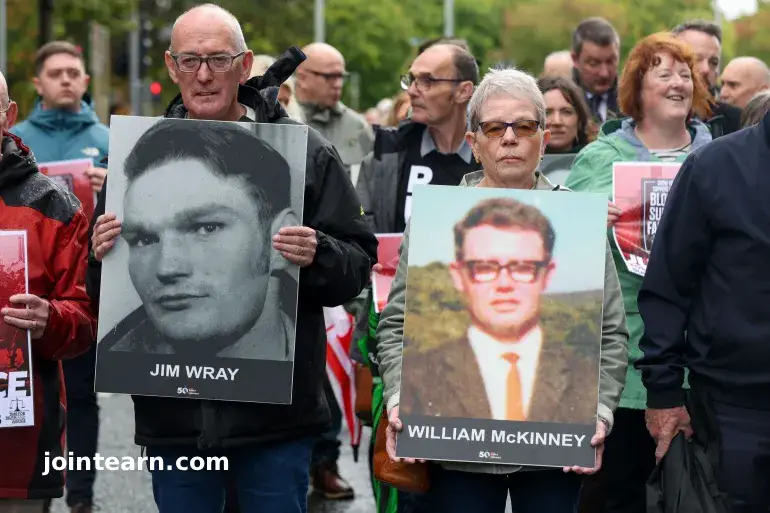
Belfast, October 23, 2025 — A Belfast court has acquitted a former British soldier, known only as Soldier F, of murder and attempted murder charges related to the 1972 Bloody Sunday massacre in Derry, igniting a wave of anger from victims’ relatives and condemnation from Northern Ireland’s political leadership.
The verdict, delivered by Judge Patrick Lynch at Belfast Crown Court, found that the prosecution had failed to meet the burden of proof, citing significant delays and evidentiary challenges. However, the judge also acknowledged that soldiers had “lost all sense of military discipline” during the incident, calling their actions “shameful.”
The Verdict and Its Implications
The ruling cleared Soldier F of two counts of murder—those of James Wray and William McKinney—and five counts of attempted murder. The former paratrooper, shielded from public view by a blue curtain, remained silent as the judge read the decision.
The Bloody Sunday massacre, which took place on January 30, 1972, saw British paratroopers open fire on more than 10,000 unarmed Catholic civil rights demonstrators in Derry. Thirteen civilians were killed on the day, and another died from his injuries later. The atrocity became a turning point in the Troubles, fueling decades of sectarian conflict in Northern Ireland until the Good Friday Agreement brought a fragile peace in 1998.
Judge Lynch acknowledged the atrocity’s gravity but cited procedural failures:
“Delay has, in my view, seriously hampered the capacity of the defence to test the veracity and accuracy of the hearsay statements,” he stated.
Background: Decades of Investigations
The original Widgery Tribunal in 1972 largely absolved British troops and authorities of wrongdoing, a finding widely dismissed as a whitewash.
In contrast, the Saville Inquiry (2010) found that the killings were “unjustified and unjustifiable,” determining that soldiers had fired upon unarmed civilians who posed no threat.
That report led to a renewed murder investigation and charges against Soldier F—the only British soldier to face trial. Prosecutors had earlier declined to charge 16 other soldiers due to insufficient evidence.
Soldier F did not testify during the non-jury trial, claiming memory loss of the events.
Families and Political Leaders React
Outside Belfast Crown Court, Mickey McKinney, brother of one of the victims, denounced the ruling:
“Soldier F has been discharged from the dock, but it is one million miles away from being an honourable discharge. He created widows and orphans, and justice has once again been denied.”
McKinney directly blamed the British government and the Royal Ulster Constabulary (RUC) for mishandling the original investigation, saying authorities “failed to investigate the murders properly, or indeed at all.”
Northern Ireland’s First Minister Michelle O’Neill, leader of Sinn Féin, condemned the decision on social media, writing:
“The continued denial of justice for the Bloody Sunday families is deeply disappointing. Not one British soldier or their superiors has ever been held accountable. That is an affront to justice.”
The UK government, in response, issued a statement expressing sympathy for the families while defending the legal process:
“The UK is committed to finding a way forward that acknowledges the past while supporting those who served their country during a difficult period in Northern Ireland’s history.”
Historical Context: A Wound That Never Healed
The Bloody Sunday massacre remains one of the most traumatic episodes in British-Irish history, symbolizing the deep divisions of the Troubles. The killings galvanized recruitment for the Irish Republican Army (IRA) and intensified anti-British sentiment across Ireland and beyond.
More than 50 years later, families of the victims continue to campaign for justice and accountability, arguing that the British state has shielded those responsible from prosecution.
With the acquittal of Soldier F, activists fear this may mark the final legal chapter in the decades-long quest for justice for the 14 men who were killed while marching for civil rights.


Leave a Reply